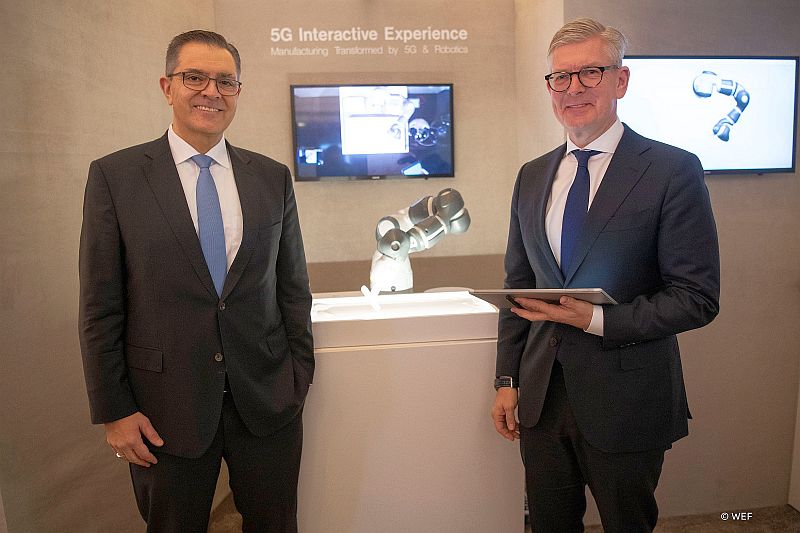ABB and Ericsson pave the way for digital transformation of industries
ABB and Ericsson, together with Swisscom, showcase for the first time, how easily and effectively robots can be controlled over wide distances utilizing the real-time communication capabilities of 5G.
During WEF 2020, world leaders will witness the potential of no-latency communication enabled by 5G. At the Congress Center in Davos, Switzerland, an ABB YuMi® collaborative robot will carve a message in a sandbox that will be replicated at the same time by a second YuMi® robot located 1.5 km away.
The simultaneous action will be enabled through Swisscom’s 5G network equipped with Ericsson technology in real-time and viewed on video screens at both locations. Based on a multi-year technical collaboration, ABB and Ericsson have developed the fundamental technologies needed to connect machines via a 5G mobile network.
“ABB will continue to drive the digital transformation of industries by investing in developing innovative solutions and products. Our partnership with Ericsson and Swisscom helps us to seize the full potential of 5G for industrial manufacturing” said Peter Voser, ABB CEO and Chairman. Sami Atiya, President of ABB’s Robotics and Discrete Automation business said: “5G wireless technologies make it easier to connect robots to the cloud and factory automation systems, enabling faster access to more data and better decision-making based on insights which will help improve efficiency and reliability through the entire production cycle. As we replace traditional wire set-ups with 5G mobile networks, we can significantly increase flexibility in manufacturing.”
”5G technology partnerships across business, government and society are key to developing the digital economy. By embracing and enabling such partnerships, new digital opportunities can be realized to benefit the global economy, national economies, and businesses of all sizes,” said Börje Ekholm, President and CEO, Ericsson.
Urs Schaeppi, CEO Swisscom, said: "The joint demo uses our live 5G network in Davos to give a glimpse of the capabilities and various possibilities of 5G for manufacturing and robotics. The time is now to step into 5G."
With this technology the companies pave the way for the highest flexibility for machines on the factory floor. Utilizing 5G networks, the deployment and operations of large fleets of autonomous machines and robots will become a reality.
A significant benefit from 5G in industrial environments is that instead of a single control/single purpose operating approach, multi-machines can be controlled by one central resource, reducing the cost of managing and maintaining OT as well as IT systems, on a global basis.
ABB is continuously working towards autonomous industries across customer segments. For example, as a world’s first, ABB enabled a ferry to be remote-controlled across the Helsinki harbor at the end of 2018. 5G is an enabling technology that will help drive digital transformation of industries, increasing productivity, efficiency and quality in manufacturing worldwide.
«Mit Investitionen in die Entwicklung innovativer Lösungen und Produkte wird ABB die digitale Transformation von Industrien weiter vorantreiben. Dank unserer Partnerschaft mit Ericsson und Swisscom können wir das volle Potenzial ausschöpfen, das die 5G-Technologie für die industrielle Fertigung bereithält», sagte Peter Voser, CEO und Verwaltungsratspräsident von ABB. Sami Atiya, Leiter des ABB-Geschäftsbereichs Robotik und Fertigungsautomation, sagte: «Die 5G-Technologie erleichtert die Vernetzung von Robotern mit der Cloud und Fabrikautomationssystemen. Sie ermöglicht einen schnelleren Zugang zu mehr Daten und verbessert Entscheidungsprozesse. Dies steigert die Effizienz und Zuverlässigkeit über den gesamten Produktlebenszyklus hinweg. Indem wir traditionelle Netze durch 5G-Mobilfunknetze ersetzen, können wir die Flexibilität in der Fertigung deutlich erhöhen.»
"Technologiepartnerschaften zwischen Unternehmen, Regierungen und der Gesellschaft im Bereich 5G tragen entscheidend zur Weiterentwicklung der digitalen Wirtschaft bei. Mit diesen Partnerschaften können neue Chancen im digitalen Bereich realisiert werden. Davon profitierten globale und nationale Volkswirtschaften sowie Unternehmen aller Grössen", sagte Börje Ekholm, Präsident und CEO von Ericsson.
Urs Schaeppi, CEO Swisscom, sagte: "Bei dieser gemeinsamen Präsentation nutzen wir unser 5G-Livenetz in Davos und zeigen, wie die Bereiche Fertigung und Robotik von den Funktionen und verschiedenen Einsatzmöglichkeiten der 5G-Technologie profitieren können. Die Zeit ist reif für den Umstieg auf 5G."
Mit dieser Technologie ebnen die Unternehmen den Weg für Produktionsanlagen mit einem Höchstmass an Flexibilität. Der Einsatz und Betrieb grosser, autonomer Maschinen- und Roboterflotten wird mit 5G zur Realität.
Ein grosser Vorteil der 5G-Technologie besteht darin, dass in industriellen Umgebungen keine Einzweckmaschinen per Einzelsteuerung betrieben werden müssen, sondern mehrere Maschinen von einer einzigen Ressource gesteuert werden können. Dadurch werden auf globaler Basis die Kosten für die Steuerung und Instandhaltung von OT- und IT-Systemen gesenkt.
ABB treibt die Entwicklung autonomer Branchen in allen Kundensegmenten voran. So ermöglichte ABB Ende 2018 die Fernsteuerung einer Fähre im Hafen von Helsinki – eine Weltpremiere. Die 5G-Technologie trägt zur digitalen Transformation von Industrien bei und erhöht die Produktivität, Effizienz und Qualität in der weltweiten Fertigung.
Quelle: ABB
